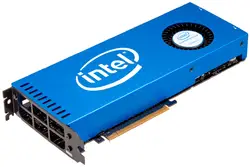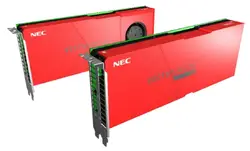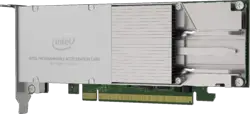
Accelerator cards are specialty expansion cards designed primarily for the acceleration of domain-specific workloads such as vector operations, ANNs, cryptography, and graphics.
Contents
Overview
Accelerator cards are a special type of expansion cards designed specifically for the purpose of accelerating various workloads. Generally, those cards are plugged via a PCIe slot and are seen as standard PCIe devices by the host processor. Using special library code, usually provided by the card manufacturer, programs can instruct the accelerator card to perform various operations. Those operations are then performed by the card and the result is sent back to the host processor.
Typically, but not always, accelerator cards make use of custom ASIC chips (known as accelerators) in order to execute such workloads far more efficiently than what a normal general-purpose microprocessor would be capable of. Typically, those operations are done quicker ("accelerated") on the card than the processor could perform on its own because the accelerator incorporate specialized logic to perform a set of complex operations in a way that cannot be implemented in software as easily or as efficiently. Various FPGA-based accelerator cards also exist allowing the user to implement his own hardware acceleration functions.
Types
Types of accelerator cards:
- AI Accelerator Cards
- Compression Accelerator Cards
- Cryptographic Accelerator Cards
- SSL Accelerator Cards
- DSP Accelerator Cards
- Programmable Accelerator Cards
- Graphics Accelerator Cards
- Vector Accelerator Cards
Form factors
Traditionally, accelerator cards used the standard PCIe card form factor. More recently, accelerator cards became available in a number of other form factors such as an M.2 PCIe board, OCP Accelerator Module, and EDSFF ruler cards.
Cards
| This section is empty; you can help add the missing info by editing this page. |

